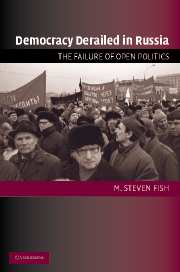Book contents
- Frontmatter
- Contents
- List of Figures and Tables
- Acknowledgments
- Abbreviations
- 1 INTRODUCTION
- 2 SOME CONCEPTS AND THEIR APPLICATION TO RUSSIA
- 3 SYMPTOMS OF THE FAILURE OF DEMOCRACY
- 4 THE RUSSIAN CONDITION IN GLOBAL PERSPECTIVE
- 5 THE STRUCTURAL PROBLEM: GREASE AND GLITTER
- 6 THE POLICY PROBLEM: ECONOMIC STATISM
- 7 THE INSTITUTIONAL PROBLEM: SUPERPRESIDENTIALISM
- 8 CAN DEMOCRACY GET BACK ON TRACK?
- References
- Index
- Titles in the series
2 - SOME CONCEPTS AND THEIR APPLICATION TO RUSSIA
Published online by Cambridge University Press: 05 September 2012
- Frontmatter
- Contents
- List of Figures and Tables
- Acknowledgments
- Abbreviations
- 1 INTRODUCTION
- 2 SOME CONCEPTS AND THEIR APPLICATION TO RUSSIA
- 3 SYMPTOMS OF THE FAILURE OF DEMOCRACY
- 4 THE RUSSIAN CONDITION IN GLOBAL PERSPECTIVE
- 5 THE STRUCTURAL PROBLEM: GREASE AND GLITTER
- 6 THE POLICY PROBLEM: ECONOMIC STATISM
- 7 THE INSTITUTIONAL PROBLEM: SUPERPRESIDENTIALISM
- 8 CAN DEMOCRACY GET BACK ON TRACK?
- References
- Index
- Titles in the series
Summary
A Definition of Democracy
Characterizing the political regime depends not only on one's interpretation of facts and understanding of conditions but also upon the standards of measurement, concepts, and expectations that one brings to the task of evaluation. Put another way, the characterization of cases depends upon the criteria for classification as well as the comparative referent. If one's definition of “revolution” contains violent overthrow of the regime as a diagnostic feature, then even Hungary's and South Africa's transformations of the early 1990s would fail to qualify as revolutions, whereas Congo-Zaire's regime change in the late 1990s would meet the standard. If one's definition is based on the distance between the old and new regimes in the extent of popular control over the state, the Hungarian and South African transformations were revolutions and the change of regime in Congo-Zaire was not.
Similarly, depending upon one's criteria, one could classify virtually any polity – or no polities at all – as democratic. During the Brezhnev period, Soviet ideologists claimed not only that the USSR was a democracy but also that it was one “of a higher type.” The rulers' self-professed commitment to the welfare of the people and the people's supposedly extraordinary – if elusive and mysterious – control over the state qualified the polity for such status. Few analysts would now take seriously such a conception of democracy, but even within mainstream Western political science, a multiplicity of definitions and conceptions of democracy is available.
- Type
- Chapter
- Information
- Democracy Derailed in RussiaThe Failure of Open Politics, pp. 15 - 29Publisher: Cambridge University PressPrint publication year: 2005

